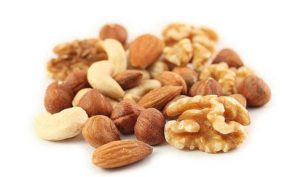Tree Nuts include, but are not limited to, almonds, Brazil nuts, cashews, chestnuts, filberts/hazelnuts, macadamia nuts, pecans, pistachios, pine nuts, sheanuts and walnuts.
Contents
Uses
- Used for salads, cooking and as a food supplement.
Benefits
-
Besides being packed with protein, most nuts contain at least some of these heart-healthy substances:
- Unsaturated fats. …
- Omega-3 fatty acids. …
- Fiber. …
- Vitamin E. Vitamin E may help stop the development of plaques in your arteries, which can narrow them. …
- Plant sterols. …
- L-arginine.
Cautions
- Nuts are known to be one of the most potent allergenic foods in terms of the amount required to elicit a response and the severity of reactions. The estimated prevalence of nut allergy in the United States is about 1.1% of the general population. Allergy to nuts often involves severe multisystemic and respiratory symptoms and occasionally fatal anaphylactic reactions are observed.
- A recent analysis of fatal food reactions in the United States showed peanuts (63%) and nuts (31%) as a major cause. In patients over six years of age nuts accounted for all fatalities. However, the most frequent symptoms are skin reactions.
Interactions
Unknown, please consult with your doctor.
Other names
n/a
References
Source: farrp.unl.edu, http://farrp.unl.edu/informalltreenuts
Mayoclinic.org, http://www.mayoclinic.org/diseases-conditions/heart-disease/in-depth/nuts/art-20046635
Wikipedia, https://en.wikipedia.org/wiki/Tree_nut_allergy
Image source: http://foodallergycanada.ca

